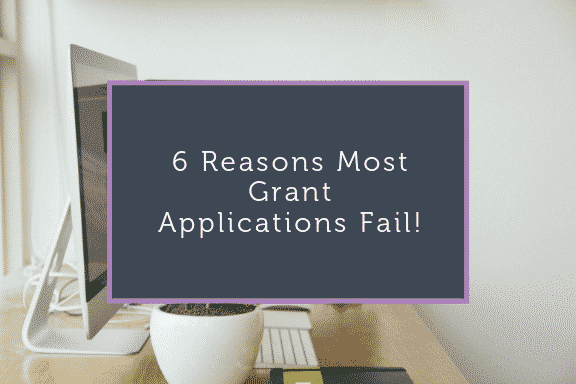Grant applications can seem a bit of an enigma, due to the large number of different ways the application forms/requirements can be worded and set out. In fact, the reasons applications fail are consistent no matter what the application format. Below are the 6 most common reasons grant applications fail. If you can avoid these (well the avoidable ones at least!) then you will greatly increase your grant applications success rate.
The Project is Not Eligible
Eligibility criteria is pretty straightforward – if you don’t meet it then you’re not eligible for that grant so don’t waste your time. Usually eligibility centres around two things:
- The type of organisation – incorporated/not for profit/commercial business/local government etc.
- The type of project – infrastructure/community project/regionally based/Aboriginal employment and the list goes on.
The rest of the Eligibility Criteria fall out of these two main areas. This is the first thing you should check when you are looking at a grant – and check each listed criterion in detail. Putting hours of effort into applying for a grant you’re not eligible for can be heartbreaking!
If you’re unsure or think your project may need to be amended slightly to suit a certain grant, then pick up the phone and talk to the organisation giving away the money. In most cases the grant will provide contact details for a person you can speak with – this will usually be one of the assessment officers. Do not be afraid to talk to them about your project and get advice about whether your project is eligible or how it could be improved. The organisation WANTS to give away this money to achieve its outcomes so if they can help you to tailor your project to better meet their needs, then they will. The last thing an assessor wants is to have to read through an application that isn’t even eligible or could have been brilliant if only a few tweaks had been made to the project.
Lack of Evidence
Many applications fail due to a lack of evidence – the application makes claims that have not been backed up. For example, if you have gone to all the trouble of collecting quotes for completing your project, then make sure you attach the quotes as evidence. If the application form doesn’t allow this, then state in your application what the quote was and that it can be provided upon request. This proves to the assessor that you have planned your project on the basis of factual information and not just your best guess! It gives you credibility and removes any question from the assessor’s mind about the legitimacy of your claim.
Without evidence to back up your claims, they are essentially worthless so make sure you go through your application and highlight any claims you have made and make sure you have provided evidence. Note: anything you have stated to show the assessor the cost of the project, its feasibility, the need for the project or the project’s sustainability are very important claims that need evidence.
Project Familiarity
Applications can fail even if they are written by people who are good writers and are experts in their field. A big reason for this is that people assume knowledge. They are excited about their project and forget that the assessor doesn’t know what you do. Don’t assume that the grant assessor knows your town/your organisation/ your project because chances are that they do not. Always ask an outsider – someone who doesn’t know your project or business at all, to read your application before you submit it. You’ll be surprised by the kinds of questions they ask that you had assumed would be self-explanatory. Just make sure they are willing to put in the time to have a thorough read and that they know you WANT them to ask questions and critique it.
Not Answering the Question
Answer the Question!! Don’t lose sight of the question and write what you think the assessor wants to hear. This happens very regularly when people get caught up in ‘selling’ their project. They write about all the wonderful parts of their project but don’t actually answer the question. All grants have assessment criteria – the factors your grant applications will be scored against. If you don’t answer these criteria, then your application cannot succeed. Print out the assessment criteria and stick them to your computer before you start writing. This will help you to refer to them throughout the application and not lose sight of the question.
Forgetting the Target Audience
Ask yourself about the assessors – Why is this organisation providing funds – what do they want to achieve by giving away money? How can we prove to them that we will spend their money wisely and we will achieve their aims? (this is important! Focus on their aims, not necessarily yours). In writing grant applications, you should always put yourself in the assessor’s shoes. If you can walk them through how your project will achieve the outcomes that they are seeking then you stand a very good chance at being awarded the money.
Remembering your target audience will also enable you to see any potential ‘deal breakers’ in your application. For example, if you are seeking government funds and your application makes it clear that your project will show favouritism to a certain area/group/sector then you will need to show a very clear reason why this is acceptable and how this decision has been made in an open and transparent way. Government cannot be seen to be providing for one area and not another unless there is a clear and defendable reason why.
Too Many Good Projects
Most grant funding rounds are oversubscribed, meaning more money is requested than is available. If there are an abundance of good projects that meet the criteria, will achieve the funder’s aims, are backed up by evidence and well written, then it may all come down to how your project compares to the others. Will the others have a larger impact, have the other organisations put in more leveraged funding so the value for money on that project is higher, have the other organisations previously done similar projects successfully and are therefore less of a risk – sometimes it is not your application that is the problem. In this instance, take the feedback for the positive it is (always ask for feedback if you’re unsuccessful and the funding body allows it!) and try again next time. This is not the main reason grants fail so if you have got to this point then pat yourself on the back and know that you should not be far away from getting those funds.






